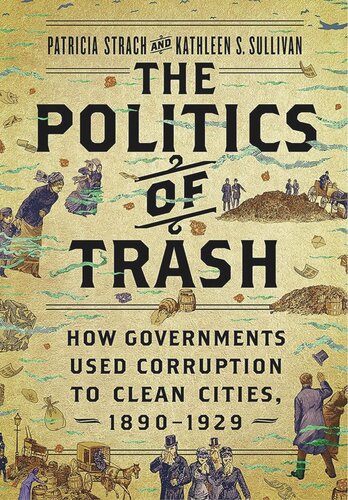

Most ebook files are in PDF format, so you can easily read them using various software such as Foxit Reader or directly on the Google Chrome browser.
Some ebook files are released by publishers in other formats such as .awz, .mobi, .epub, .fb2, etc. You may need to install specific software to read these formats on mobile/PC, such as Calibre.
Please read the tutorial at this link: https://ebookbell.com/faq
We offer FREE conversion to the popular formats you request; however, this may take some time. Therefore, right after payment, please email us, and we will try to provide the service as quickly as possible.
For some exceptional file formats or broken links (if any), please refrain from opening any disputes. Instead, email us first, and we will try to assist within a maximum of 6 hours.
EbookBell Team

5.0
38 reviewsThe Politics of Trash explains how municipal trash collection solved odorous urban problems using non-governmental and, often, unseemly means. Focusing on the persistent problem of filth and the frustration of generations of reformers unable to clean their cities, Patricia Strach and Kathleen S. Sullivan tell a story of dirty politics and administrative innovation that made rapidly expanding American cities livable.
The solutions professionals recommended to rid cities of overflowing waste cans, litter-filled privies, and animal carcasses were largely ignored by city governments. Where the efforts of sanitarians, engineers, and reformers failed, public officials turned to the habits and tools of corruption as well as gender and racial hierarchies.
Corruption often provided the political will to public officials to erect garbage collection programs. Effective waste collection involves translating municipal imperatives into private habits and new arrangements in homes and other private spaces. To change domestic habits, officials relied on gender hierarchy to make the woman of the white, middle-class household in charge of sanitation. When public and private trashcans overflowed, racial and ethnic prejudice singled out scavengers, garbage collectors, and neighborhoods by race. These early informal efforts were slowly incorporated into formal administrative processes that created the public-private sanitation systems that prevail in most American cities today.
The Politics of Trash locates these hidden resources of governments to challenge presumptions about the formal mechanisms of governing, and recovers the presence of residents at the margins, whose experiences can be as overlooked as garbage collection itself. This consideration of municipal garbage collection reveals how political development relies on undemocratic means with long-term implications for further inequality. The resources that cleaned American cities also show the tenuous connection between political development and modernization.